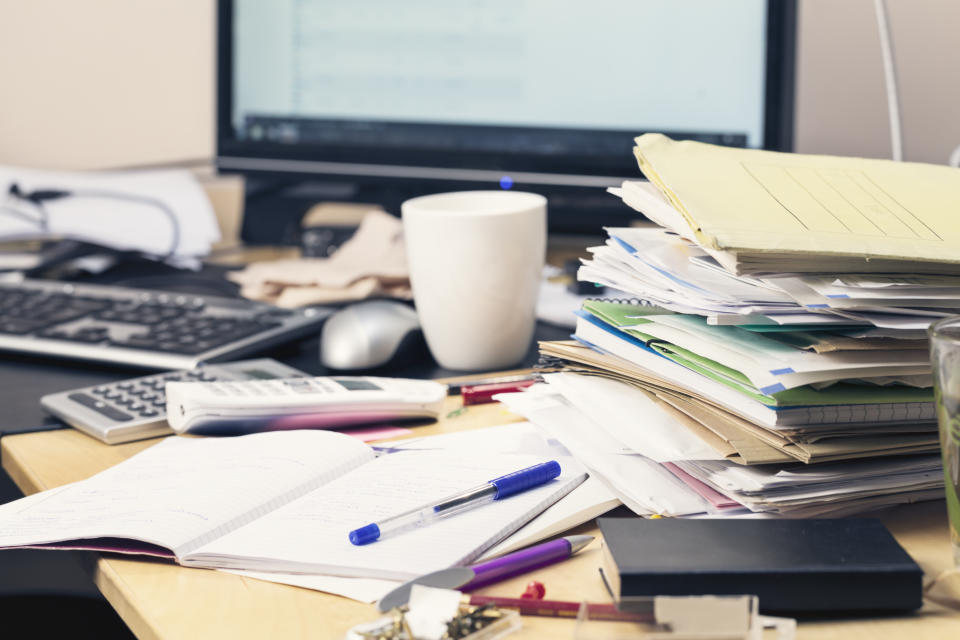Why a messy workspace might actually be helpful

If you struggle to find anything among the old coffee cups, scraps of paper and other debris cluttering your desk, you aren’t alone. Many of us are guilty of having a messy workspace and no matter how many times we tidy it up, it just ends up the same in a few days.
According to a survey of more than 2,000 UK office workers, a third admitted to having a disordered desk. Having a disorganised desk does have its downsides – not least, that it takes us longer to find things amid the chaos. It also has a bad reputation, too. According to a study by the University of Michigan Flint and Ann Arbor, it even leads our colleagues to perceive that we’re more neurotic, less agreeable and even uncaring.
But is having a messy desk so bad – and are there any benefits?
“If a cluttered desk is the sign of a cluttered mind, of what, then, is an empty desk a sign?” These words have been attributed to Albert Einstein and regardless of whether he said them or not, many other creative geniuses have touted the benefits of a messy workspace. Apple founder Steve Jobs allegedly kept his office cluttered, as did Thomas Edison.
Read more: Should we ban open-plan offices?
And according to one study, they may have been onto something. Researchers at the University of Minnesota tested how well students came up with new ideas when working in orderly versus disorderly work areas. Working at a clean and prim desk may promote healthy eating, generosity, and conventionality, the results suggested, but a messy desk may confer its own benefits, promoting creative thinking and stimulating new ideas.
“Prior work has found that a clean setting leads people to do good things: Not engage in crime, not litter, and show more generosity,” researcher and psychological scientist Kathleen Vohs. “We found, however, that you can get really valuable outcomes from being in a messy setting.”
In the first of several experiments, participants were asked to fill out some questionnaires in an office. Some completed the task in an orderly space, while others did so in one where papers were strewn about and office supplies were all over the place. After, the participants were presented with the opportunity to donate to a charity, and they were allowed to take a snack of chocolate or an apple on their way out.
The outcome suggested being in a clean room seemed to encourage people to do what was expected of them – they donated more of their own money to charity and were more likely to choose the apple. In another experiment, people were asked to come up with new uses for ping pong balls.
Read more: Are trendy office spaces really the key to worker happiness?
“Participants in the messy room generated the same number of ideas for new uses as their clean-room counterparts. But their ideas were rated as more interesting and creative when evaluated by impartial judges,” Vohs said. “Being in a messy room led to something that firms, industries, and societies want more of: Creativity.”
When given the choice between a new product and an old one, those in the messy space were more likely to select the newer one. “Disorderly environments seem to inspire breaking free of tradition, which can produce fresh insights,” Vohs said.
However, research has also suggested there are downsides to having a cluttered workspace. One issue is that our physical environment affects our emotions and the way we think – and that messy spaces can negatively impact our stress and anxiety levels. In 2009, research from the US found the levels of the stress hormone cortisol were higher in mothers whose home environment was cluttered.
“There is clear research evidence that physical work environments (ie, material spaces and objects) influence employee performance and wellbeing,” 2018 research by Dr Libby Sander states.
Having a messy desk might not be the end of the world and for those working in creative industries, it may be of some benefit. But a tidy workspace has its positives – and it might save us time, too.

 Yahoo Finance
Yahoo Finance 
